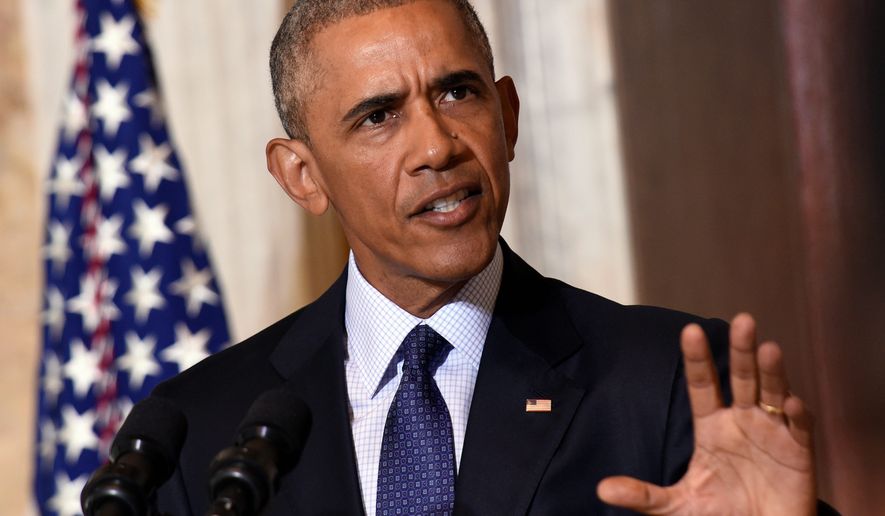President Obama defended his refusal to name “radical Islam” as a threat by saying he didn’t want to legitimize terrorist claims to a religious war, but critics say it is part of a pattern of denial and deception when the administration explains its dealings with the Muslim world.
The knee-jerk decision to redact references to Islam in the Orlando shooter transcripts was the latest attempt by the Obama administration to edit or hide information about Muslims or Islamic governments.
Similar moves began as soon as Mr. Obama took office with the deletion of “radical Islam” from the government’s anti-terrorism playbook and was repeated from classifying the Fort Hood shooting as workplace violence to blaming the attack in Benghazi, Libya, on a YouTube video and dismissing the Islamic State in Iraq and Syria as the “JV team.”
The same mindset appeared to be at play when the Obama administration brokered secret side agreement to the nuclear deal with the Islamic Republic of Iran and then erased video of State Department spokeswoman Victoria Nuland denying it at a 2013 press conference.
Secretary of State John F. Kerry vowed to get to the bottom of who edited the agency’s videotape.
Katharine C. Gorka president of the Council on Global Security, said the administration’s denial of radical Islam is rooted in Mr. Obama view of Islamic extremism through the lens of social movement theory, equating extremists with activists who have legitimate grievances.
The outlook has hobbled the U.S. counterterrorism strategy, Mrs. Gorka wrote in a 2012 white paper titled “The Flawed Science Behind America’s Counter-Terrorism Strategy.”
“Extremists are viewed as ’activists’ with legitimate grievances, whether against colonialism, modernism, poverty and unemployment, or simply ’the West,’” she wrote. “As a result, Obama’s [counterterrorism] strategy has focused primarily on targeting individual perpetrators and addressing ’upstream causes,’ rather than on countering an ideology that is at war with the United States.
“Until the U.S. begins to acknowledge and address the ideology, we will not be able to challenge its ability to recruit, motivate and inspire those who wish to kill us,” she said.
Republicans have long criticized Mr. Obama and top administration officials, including Mr. Kerry, for taking pains not to acknowledge the threat from Islamic extremism around the world and at home.
But presumptive Republican presidential nominee Donald Trump sustained sharp rebukes in the press when he questioned Mr. Obama’s aversion to the phrase in the wake of the June 12 attack in Orlando, where a gunman pledging allegiance to the Islamic State group killed 49 people in the most deadly terrorist strike in the U.S. since 9/11.
“People cannot believe that President Obama is acting the ways he acts and can’t even mention the words ’radical Islamic terrorism,’” Mr. Trump mused on Fox News’ “Fox & Friends” show. “There’s something going on. It’s inconceivable. There’s something going on.”
Pundits accused Mr. Trump of questioning whether the president sympathizes with terrorists.
The administration’s quest for alternative explanations for terrorism came into sharp focus after the Sept. 11, 2012, attack by heavily armed militants on the U.S. diplomatic compound in Benghazi, Libya, which killed U.S. Ambassador J. Christopher Stevens and three other Americans.
A week later, U.S. Ambassador to the United Nations Susan E. Rice blamed the attack on a spontaneous riot by Muslims outraged by a YouTube video that mocked the Prophet Muhammad.
Mr. Obama condemned the video in a speech to the United Nations, calling it “crude and disgusting.”
“The United States government had nothing to do with this video, and I believe its message must be rejected by all who respect our common humanity,” he said two weeks after the Benghazi attack.
The families of the American victims said Hillary Clinton, as secretary of state, personally pledged that the U.S. government would bring those responsible for the video to justice. Mrs. Clinton, now the presumptive Democratic presidential nominee, denies those assertions.
The YouTube excuse advanced the election-year narrative that Mr. Obama was defeating global terrorism. But the episode also underscored the administration’s zeal for identifying legitimate grievances in the Muslim world.
• S.A. Miller can be reached at smiller@washingtontimes.com.




Please read our comment policy before commenting.